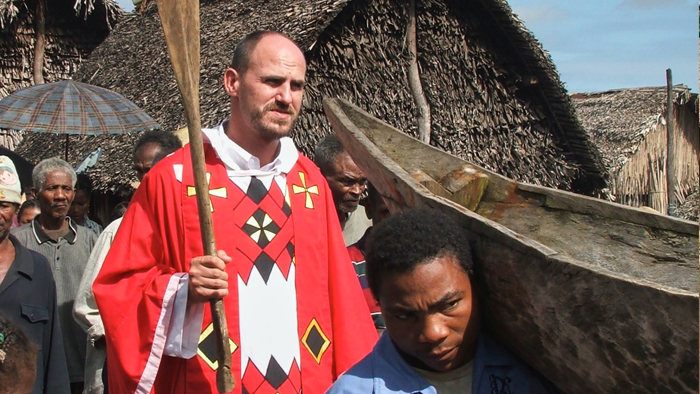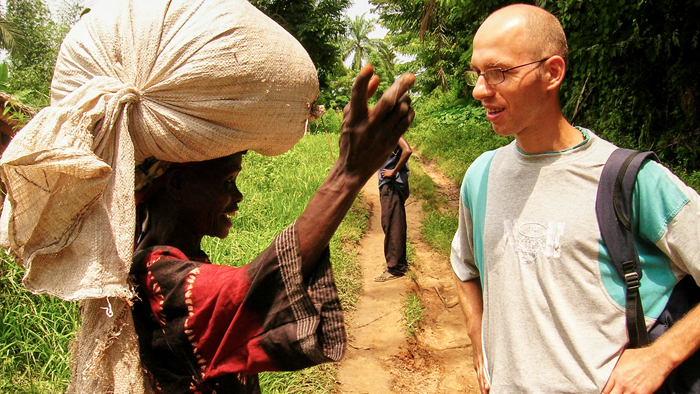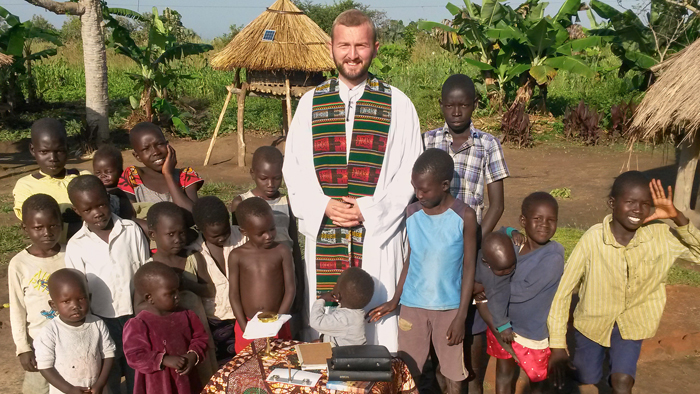During this year of Jubilee celebrations people have often asked, “So what makes you SVD Fathers so different?” I take this as both an honor and a challenge. They have seen the beautiful blue banners of Arnold Janssen and Joseph Freina-demetz, and those of our Sisters at our Church entrances and sanctuaries. They have experienced some of the changes like adding the addition of Vietnamese and Latino Masses or offer-ing special services and celebrations for groups that were barely noticed before, like the Filipinos, Samoans, Native Americans, and Indians of the Syro-Malabar rite. Besides these highly visible changes in our parishes, many have noticed some deeper things, like our devotion to the people, long hours in the confessional and immediately responding to a sick call.
During our 150th Jubilee celebration at Simon and Jude Ca-thedral in Phoenix, I tried to answer this question in my hom-ily: What makes us different from ordinary diocesan priests? What makes us tick? In my own personal view, it is not so much the fact that we take perpetual vows of pov-erty, chastity, and obedience, although this is important for it marks us Religious. But it does not touch on the deeper levels—our missionary identity—the Spirit that flows from the Incarnation of the Divine Word.

Christ did not cling to his Divinity in heaven but came down to become human like us. He took on Jewish life and culture, learned Aramaic and probably Greek. He studied the scriptures and worshiped at Synagogues. He dressed like a Jew and ate their food. In every respect he was culturally a Jewish man. And He grew into His humanity and Divinity which was revealed at his baptism with the words: “This is my Beloved Son in whom I am well pleased!” By his life Jesus showed that our vocation as humans is to grow continually in the range and depths of our relationships with God and others. It is through our relationships with each other that we relate to God. He was a Jew, but He did not cling to His Jewishness. He had a family but opened himself to deep encounters with everyone and all of creation. He knew the Scriptures but was not bound by the narrow understanding of the leaders. Rather, he expanded on their meaning and fulfilled them. Friend or foe, He was open to all. He honored tradition but was not bound by it. He freely crossed physical and cultural barriers. He accepted for-eigners and healed them. He ate with sinners and forgave them. He identified with outcasts and suffered their rejection. For this he was finally condemned and put to death. Jesus embodied God’s Mission.
As SVDs, we take his place and continue his mission in our modern world. Like him we grow by emptying ourselves and going beyond the limits that confine us. We grow in the range and depths of our relationship with others and thereby with God. It is by continually emptying ourselves that God’s mission is fulfilled in us.
Our 150-year history has confirmed our growth and made it tangible, seen and measured. What began in the small mission house at Styl has grown to an enormous family with three branches—the SVD, SSpS and SSpSAP. When I went to Ghana in 1972, there was only one Ghanaian SVD priest. Pat Ofori, who was in the class ahead of me at Techny. To-day there are more than 200. Our nearly 6,000 members work as one in almost 80 countries. Every year more than 100 missioners are sent to these countries. But this growth is more than numbers. Most of our new missionaries now come from the poor and underdeveloped countries of Africa and Asia. Some call it “reverse mission,” but it is really mission in a new globalized context. Mission itself has grown to be global and local.

This first became noticeable about 30 years ago. Our missionaries were suddenly speaking different languages than before, thinking and acting in different ways. Like their predecessors, they went to foreign countries, but now without losing their first language or identity they put it aside to grow into their new language, culture and worldview. In this they grow and expand their own horizons and those to whom they are sent. Togeth-er, they expand and grow. They grow with them, and expand their worlds by offering their special African and Asian experiences of the Gospel.
God loves diversity! In the midst of today’s global, multicultural contexts, we embody God’s mission and ena-ble others to cross over, expand, and grow, and fulfill God’s plan for creation. In this our SVDs are true mis-sionary disciples in the new missionary matrix of a greatly expanded World Church.
To be a missionary in our time is more difficult than before. But we are not alone. As we live out God’s mis-sion, He is doing the real work. We only need to follow the lead of Christ crossing barriers and nurturing the growth of true relationships. Amid the joyful festivities of our 150th Anniversary, keep in mind our true missionary identity—the Incarna-tion. Like Jesus, we are called to transformative growth by continual self-emptying.
Jon P Kirby SVD

